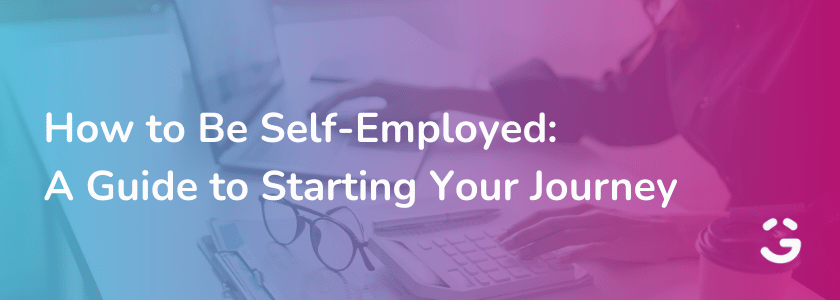Taking the leap to work for yourself can feel overwhelming. If you’ve ever daydreamed about leaving the traditional 9-to-5 grind, you’re not alone. Many people consider becoming self-employed but hesitate due to uncertainty about where to begin.
Not to worry, this guide will walk you through the basics of how to be self-employed, helping you take that first step toward a flexible and independent career.
The Basics of Becoming Self-Employed: Why Professionals Make the Switch
The shift to self-employment is more than just a career change—it’s often a lifestyle choice. Many professionals make the move because traditional employment no longer meets their need for financial diversification or aspirations.
Whether it’s the pursuit of flexibility, financial independence, or personal fulfilment, the reasons behind becoming self-employed vary widely. Below are some of the key motivations and benefits of becoming self-employed:
- Flexibility and Work-Life Balance: Learning how to work for yourself gives you control over your schedule, allowing you to manage personal and professional commitments more effectively. This flexibility is especially appealing to those with families or a desire for a healthier work-life balance.
- Greater Earning Potential: When you go self-employed, your income isn’t limited by a fixed salary. Self-employed individuals can set their rates, take on multiple clients, and explore additional revenue streams, leading to greater financial freedom.
- Control Over Career Choices: Understanding how to be self-employed opens the door to choosing the projects, clients, and industries that align with your passions and goals. This autonomy makes work more meaningful and rewarding.
- Opportunities for Growth: Becoming self-employed often involves developing new skills, building a network, and growing a personal brand. These experiences contribute to significant professional and personal growth.
- Pursuit of Passion: Many professionals switch to self-employment to focus on work they truly enjoy. Whether it’s a creative pursuit or turning a niche skill into a business, knowing how to go self-employed helps transform hobbies into sustainable careers.
Tips to Becoming Self-Employed
Starting the journey to self-employment can feel daunting, but it’s also one of the most rewarding career moves you can make.
Below are actionable tips to help you navigate this exciting new chapter with confidence.
1. Set Clear Goals and Plan Strategically
Before taking the plunge, outline what you want to achieve. Are you aiming for financial independence, a better work-life balance, or the freedom to work on projects you’re passionate about?
Understanding how to work for yourself requires research, particularly about your industry, to determine demand and competition. On top of that, knowing practical details, such as how to report self-employment cash income, is crucial to staying compliant with tax regulations. Having a solid plan ensures you’re prepared for challenges and gives you a clear path forward.
2. Build a Financial Cushion
One of the key aspects of how to go self-employed is managing your finances. Self-employment often comes with irregular income, especially in the early stages. Building a financial safety net to cover your living expenses for at least three to six months can provide peace of mind while you establish your business.
Aside from that, track your expenses meticulously and set aside funds for taxes. Essential self-employment apps like QuickBooks or Wave can simplify bookkeeping and keep your finances in order. Becoming self-employed also means understanding how to price your services fairly while ensuring profitability.
3. Create a Professional Online Presence
In today’s digital world, having an online presence is non-negotiable. Build a professional website or portfolio that highlights your skills, services, and achievements. Include testimonials, case studies, and a clear call to action to make it easy for potential clients to connect with you.
Don’t underestimate the power of social media. Platforms like LinkedIn, Instagram, or even TikTok, depending on your niche, can help you showcase your work, engage with your audience, and attract new clients. Knowing how to work for yourself also involves leveraging these tools to expand your reach.
4. Develop a Strong Work Ethic
When you go self-employed, discipline is everything. Create a structured schedule and stick to it. Dedicate specific hours to work, breaks, and personal time to maintain productivity and avoid burnout. Use tools like task managers or time trackers to stay organised and efficient.
5. Network and Build Relationships
Networking is essential to becoming self-employed. Attend industry events, join local business groups, or participate in online forums to connect with potential clients and collaborators. Building strong relationships often leads to valuable referrals and long-term partnerships. Learning how to be self-employed means understanding that your network can be one of your greatest assets.
The Role of Funding in Self-Employment
Even with careful planning, unexpected expenses can arise when you go self-employed. Giggle Finance can be a valuable resource for the self-employed in need of extra funding. Our platform offers quick and secure financial solutions, providing the flexibility you need to seize opportunities or handle emergencies.
Whether you’re an independent contractor, freelancer, or small business owner, having access to fast funding can make all the difference in maintaining a steady workflow.
Ready to take the leap? The path to working for yourself starts today.
